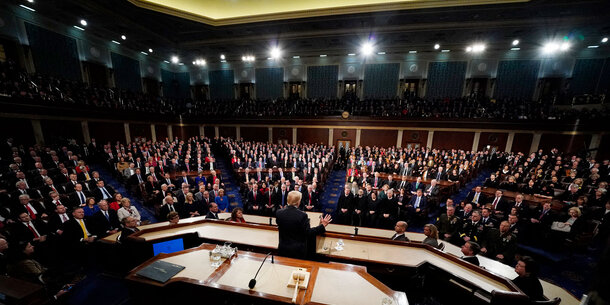Just when it seemed Congress could not be more dysfunctional, the House lost its speaker and descended into chaos last month. The polarization, gridlock, and potential for a government shutdown might leave distraught observers feeling that our national legislature is hopelessly broken. But what the public may not know is that amidst all the tumult, Congress has been working behind the scenes to make itself more effective, efficient, and transparent.
The congressional modernization efforts, which have been going on for over four years now, stand out as a rare bright spot in a sea of stagnation. Moreover, this “tale of shocking function,” as it was called in the Washington Post, could serve as a foundation for continued efforts to improve the body’s policymaking work on critical science and technology issues.
The recent reforms began in January 2019 when the House created the bipartisan Select Committee on the Modernization of Congress. As the former committee’s former chair Rep. Derek Kilmer (D-WA) explained, its mission was “making Congress work better for the American people.” Between 2019 and 2022, the committee passed 202 recommendations, over 20 percent of which have been fully implemented. An additional 88 recommendations were at least partially implemented.
Its work included a wide range of issues, such as improving staff diversity and retention, boosting congressional expertise, and streamlining processes to save taxpayer dollars. For example, the 117th Congress created a permanent office to recruit and retain diverse staff, which is far whiter than the general population. And in an aim to retain skilled employees, the institution decoupled staff from member pay, so that staff salaries are no longer limited by the salary levels of members. The House also updated communication and technology standards and improved access to congressional websites for people with disabilities.
In addition, the Government Accountability Office’s Science, Technology Assessment, and Analytics division was expanded as part of the modernization efforts. About three decades ago, Congress defunded the Office of Technology and Assessment, a congressional support agency that assisted Congress in understanding emerging science issues, in what reporter Chris Mooney called “a stunning act of self-lobotomy.”
Some of the office’s research informed important legislative action, including extending Medicare reimbursements and limiting the use of polygraph tests by employers. In 2019, the science and technology division was given more resources to carry out some of the roles of the shuttered technology office. In the four years that followed, the division’s staff grew from 49 to 157 and published 46 technology assessments and short-form explainers.
Since the Select Committee on Modernization closed its doors in 2022, modernization work has continued to develop. This year, the House Administration Committee created the permanent Subcommittee on Modernization in an effort to continue the work that the select committee started. And in September, Reps. Kilmer and William Timmons (R-SC), the former chair and ranking member of the select committee, announced the creation of the “Fix Congress Caucus,” a bipartisan group of members dedicated to improving the legislative body.
The work on these issues has been remarkably bipartisan. The Select Committee on Modernization was unique in a number of ways. Whereas most committees only hire partisan staff, it hired bipartisan staff that served members of both parties. Whereas in most committee hearings, members of opposing parties sit on opposite sides of the room, the select committee used staggered seating. Timmons reflected, “By putting policy above partisan politics, the Modernization Committee found common ground at every possible turn and advanced 105 recommendations during the 117th Congress.” Timmons called the work of the committee “the most rewarding work of my life.”
As Congress grapples with critical issues such as AI and climate change, it is important to harness this bipartisan momentum and take further steps to improve Congress’s ability to legislate on science and technology issues. A new Brennan Center report calls on Congress to continue its modernization efforts by creating a new science and technology hub in the Science, Technology Assessment, and Analytics division. This hub would collect and disseminate research and expertise to committees and individual members and help them access credible outside sources. Additionally, the newly expanded division can learn from the example of the executive branch and many legislative bodies around the world in setting up advisory councils of experts to assist in crafting policy about highly technical topics.
Second, a new science and technology hub could help Congress absorb and translate technical scientific information and brief members and staff on emerging issues. Congress is being confronted with groundbreaking technological changes, and it needs access to high-quality scientific information and the infrastructure to absorb it.
Congress can also take further steps, including increasing staffing and clarifying committee jurisdictions. And as Kilmer and Timmons recommend, it should create a bipartisan commission to explore structures and guidelines to support greater use of data and research in policymaking.
Equipped with bipartisan support and demonstrated results from recent reform, now is the time for Congress to double down and ensure it has the resources it needs to tackle contemporary policy issues.






